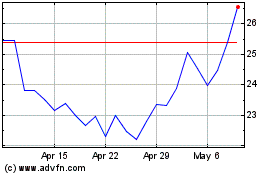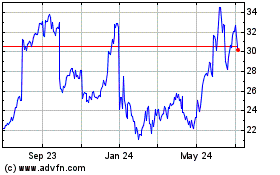Corcept Therapeutics Announces Oncology Development Program
Five of Eight Patients With Relapsed, Metastatic Triple-Negative
Breast Cancer (TNBC) Experienced a Partial or Complete Response
With Mifepristone and Chemotherapy Combination According to Data
Presented at the San Antonio Breast Cancer Symposium 2013; Company
Files Investigational New Drug Application With FDA to Launch Phase
I Study in Relapsed Metastatic TNBC
SAN ANTONIO, TX--(Marketwired - Dec 12, 2013) - Corcept
Therapeutics Incorporated (NASDAQ: CORT), a pharmaceutical company
engaged in the discovery, development and commercialization of
drugs for the treatment of severe metabolic, psychiatric and
oncologic disorders, announced plans to extend its development
program for glucocorticoid receptor (GR) antagonists, including
mifepristone, into oncology. The decision is based on a body of
early clinical and pre-clinical data from leading academic
institutions including the University of Chicago showing the
significant role that cortisol, a glucocorticoid stress hormone,
and its receptors play in chemotherapy resistance, particularly for
women with relapsed, metastatic triple-negative breast cancer
(TNBC), a form of the disease with a poor prognosis.
Rita Nanda, M.D., Associate Director, Breast Medical Oncology,
University of Chicago Medicine, today announced results of an
investigator-sponsored Phase I study of mifepristone in combination
with chemotherapy agent nab-paclitaxel (Abraxane®)(1) at the San
Antonio Breast Cancer Symposium 2013 (Abstract P2-16-21).
"We are encouraged by the results of our study, which found that
five of the eight patients with relapsed metastatic triple-negative
breast cancer who participated in the trial exhibited a partial or
complete clinical response to treatment with mifepristone plus
nab-paclitaxel. The combination of mifepristone and chemotherapy
was well-tolerated," Dr. Nanda said. "We are excited to continue
our clinical investigation into this promising therapeutic
approach."
One additional patient in the study who had
estrogen-receptor-positive metastatic breast cancer did not respond
to treatment.
Corcept has licensed patent rights from UChicagoTech, the
University of Chicago's Center for Technology Development &
Ventures, covering the use of GR antagonists in combination with
chemotherapy in the treatment of estrogen-receptor-negative breast
cancer, a form of cancer than includes TNBC.
Based on the University of Chicago's positive study and years of
in vitro and animal research, Corcept has filed an
investigational new drug (IND) application with the U.S. Food and
Drug Administration (FDA) and will conduct its own multi-center,
Phase I clinical study of mifepristone in combination with
chemotherapy drug eribulin (Halaven® Injection)(2) in patients with
relapsed, metastatic TNBC. The University of Chicago and other
leading cancer treatment centers will participate in this
open-label Phase I study of up to 40 patients with metastatic TNBC,
including an expansion phase with efficacy endpoints in GR-positive
TNBC.
"Over the last decade and a half, we have worked to identify
signaling pathways that help triple-negative breast cancer cells
resist the effects of chemotherapy," said Suzanne Conzen, M.D.,
Professor of Hematology/Oncology at University of Chicago Medicine.
"Our laboratory discovered that glucocorticoids play an important
role in activating pathways in these cells that allow them to
survive despite chemotherapy. Based on those findings, we
hypothesized that targeting the glucocorticoid receptor with the
antagonist mifepristone might prevent this downstream cell survival
response and allow chemotherapy to be more effective against breast
cancer."
The American Cancer Society estimates that more than 234,000
women in the U.S. were diagnosed with breast cancer in 2013 and an
estimated 39,620 will die of the disease by the end of the year(3).
Research shows that TNBC accounts for 15 to 20 percent of new
cases(4), yet causes roughly one-in-four of all breast
cancer-related deaths(5). Unlike hormone-receptor-positive and
HER-2-amplified breast cancers, there is no FDA-approved treatment
for TNBC and neither a targeted treatment nor a preferred standard
chemotherapy regimen for relapsed TNBC patients exists. The median
survival of patients with advanced TNBC is approximately six months
based on a retrospective review of more than 3,700 patients(6).
Targeted treatment approaches are needed.
"We increasingly appreciate the profound physiological role that
cortisol plays in many conditions and diseases," said Joseph K.
Belanoff, M.D., Corcept's Chief Executive Officer. "We would like
to thank Dr. Conzen, Dr. Nanda and Dr. Gini Fleming, Director of
the Medical Oncology Breast Program at University of Chicago
Medicine, for their years of dedication to understanding the
implications of glucocorticoids and their receptors' activity in
patients with advanced breast cancer. This work has laid the
groundwork for the use of mifepristone for metastatic TNBC. We look
forward to dosing the first patient in our study early in the first
quarter of 2014."
About Triple Negative Breast Cancer (TNBC)
Research shows that TNBC occurs more often in younger women,
African-American women, Hispanic/Latina women and women who have
BRCA1 mutations. A diagnosis of triple-negative breast cancer means
that the three most common types of receptors known to fuel most
breast cancer growth -- estrogen, progesterone, and the HER-2/neu
gene -- are not present in the cancer tumor. Since the tumor cells
lack the necessary receptors, common treatments like hormone
therapy and drugs that target estrogen, progesterone, and HER-2 are
ineffective.
About the San Antonio Breast Cancer Symposium
For thirty-six years, the Symposium's mission has been to
provide state-of-the-art information on breast cancer research.
From a one-day regional conference, the Symposium has grown to a
five-day program attended by a broad international audience of
academic and private researchers and physicians from over 90
countries. The Symposium aims to achieve a balance of clinical,
translational, and basic research, providing a forum for
interaction, communication, and education for a broad spectrum of
researchers, health professionals, and those with a special
interest in breast cancer.
About Corcept Therapeutics Incorporated
Corcept is a pharmaceutical company engaged in the discovery,
development and commercialization of drugs for the treatment of
severe metabolic, psychiatric and oncologic disorders. Korlym, a
first generation GR antagonist, is the company's first FDA-approved
medication for use in the treatment of patients with Cushing's
syndrome. Corcept has a phase 3 trial underway for mifepristone for
treatment of the psychotic features of psychotic depression, as
well as a portfolio of selective GR antagonists that block the
effects of cortisol without blocking the effects of progesterone.
It owns extensive intellectual property covering the use of GR
antagonists, including mifepristone, in the treatment of a wide
variety of metabolic, psychiatric and oncologic disorders. It also
holds composition of matter patents for its selective GR
antagonists. For more information about Corcept please visit:
www.corcept.com
1. Abraxane® is a registered trademark of Celgene Corporation.
2. Halaven® is a registered trademark used by Eisai Inc. under
license from Eisai R&D Management Co., Ltd. 3. American Cancer
Society. Cancer Facts & Figures 2013. Atlanta: American Cancer
Society; 2013 4. Susan G. Komen Website, Triple-Negative Breast
Cancer. 23 October 2013. Available at
http://ww5.komen.org/TripleNegativeBreastCancer.html, Accessed
December 6, 2013 5. Van Epps, Heather L., PHD. "Triple-Negative
Breast Cancer: Divide and Conquer." Cure Today. 17 Sept. 2013 6.
Kennecke H, Yerushalmi R, Woods R, et al. Metastatic behavior of
breast cancer subtypes. J Clin Oncol. 2010;28(20):3271-7.
"Safe Harbor" Statement under the Private Securities Litigation
Reform Act of 1995
Statements made in this news release, other than statements
of historical fact, are forward-looking statements. Forward-looking
statements are subject to a number of known and unknown risks and
uncertainties that might cause actual results to differ materially
from those expressed or implied by such statements. Forward-looking
statements in this news release include but are not limited to
statements regarding the timing and potential findings of the study
of mifepristone in combination with chemotherapy in the treatment
of metastatic triple-negative breast cancer. Actual results may
differ materially from those anticipated in these forward-looking
statements. Factors that may contribute to such differences
include, among others, Corcept's ability to initiate and conduct
clinical trials, the pace of enrollment in or the outcome of those
trials, the protections afforded by Corcept's patents and other
intellectual property rights, and the effects of rapid
technological change and competition. These and other risks are set
forth in Corcept's SEC filings, all of which are available from the
company's website (http://www.corcept.com) or from the SEC's
website (http://www.sec.gov). Corcept disclaims any intention or
duty to update any forward-looking statement made in this news
release, except as may be required by law.
Investor Contact Charles Robb Chief Financial Officer Corcept
Therapeutics Incorporated 650-688-8783 Media Contact Erich Sandoval
for Corcept Lazar Partners Ltd. Email Contact Tel: 917-497-2867
Corcept Therapeutics (NASDAQ:CORT)
Historical Stock Chart
From Mar 2024 to Apr 2024

Corcept Therapeutics (NASDAQ:CORT)
Historical Stock Chart
From Apr 2023 to Apr 2024
